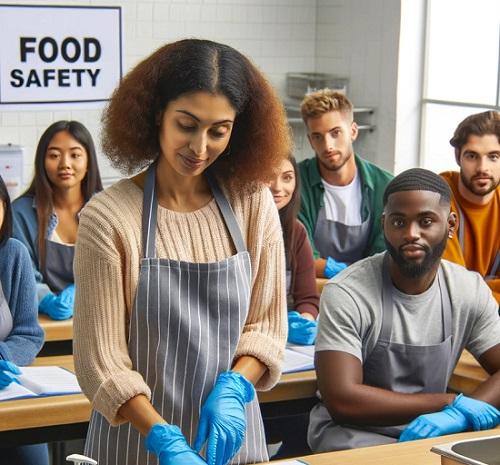Food safety is a critical aspect of the food industry, and it is especially important for food handlers to adhere to stringent safety practices to ensure the well-being of consumers. The state of California has specific regulations and requirements for food handlers to maintain high standards of safety and hygiene. In this comprehensive guide, we will delve into the various safety practices and regulations that California food handlers need to be aware of to ensure the safe handling of food.
Food Handling Practices and Regulations in California
In California, food handling is closely monitored by government agencies to prevent cases of foodborne illness and ensure compliance with regulations. The California Food Handler Card law (SB 602) was enacted to ensure that restaurant employees receive a reasonable level of training in food safety practices to reduce the potential for foodborne illness. According to this law, food handlers are required to obtain a California Food Handler Card within 30 days from the date of hire. The cards are valid for three years and are mandatory for most food service establishments in the state.
The California Food Handler Card law also specifies exemptions for certain individuals, such as those holding a valid manager’s food safety certification, workers in temporary facilities, and employees of specific food facilities like grocery stores, health care facilities, and school cafeterias. It is essential for food service businesses to maintain records documenting that each employee possesses a valid California Food Handler Card, which can be provided to local enforcement officials upon request.
For more information about obtaining a California Food Handlers card view this helpful PDF document from the California Department of Public Health:
In the United States, the Food and Drug Administration (FDA) Food Code 2017 outlines regulations for food establishments, including the assignment of a designated person in charge to ensure that employees maintain correct temperatures during cooking, cooling, and holding. Adhering to these regulations is crucial for preventing foodborne illnesses and maintaining a safe food handling environment.
Key Food Handling Practices
Effective food handling practices are essential for preventing foodborne illnesses and ensuring the safety of consumers. The core safe food handling practices, as outlined by the FDA, include clean, separate, cook, and chill. Let’s delve into each of these practices in detail:
1. Clean
Maintaining cleanliness is fundamental in food handling. Food handlers must always wash their hands before beginning food preparation. The key tip for handwashing is to use warm water and regular soap, and the handwashing process should last for at least 20 seconds. Additionally, food handlers must ensure that the tools they use for food preparation, such as cutting boards, knives, pans, and spatulas, are clean and dry.
2. Separate
Segregating different types of food is crucial to avoid cross-contamination. Raw meat, poultry, seafood, and eggs should always be kept separate from other ingredients. It is important not to use containers, plates, or cutting boards that have held raw meat, poultry, seafood, or eggs for other ingredients, unless they have been washed in hot soapy water. The same rule applies to utensils to prevent the spread of harmful bacteria.
3. Cook
Cooking food to the right internal temperatures is vital for ensuring that it is safe to consume. Utilizing food thermometers to check the internal temperature of cooked dishes is essential, especially for meat, poultry, and seafood. Proper cooking temperatures kill harmful bacteria and pathogens, reducing the risk of foodborne illnesses.
4. Chill
Maintaining proper refrigeration temperatures is crucial for food safety. Refrigerated foods should be stored at or below 40°F (4°C) to prevent bacterial growth. It is important to refrigerate leftovers promptly, ideally within 2 hours of cooking, to prevent the growth of harmful bacteria. Using shallow pans and loosely covering food while in the refrigerator facilitates cooling and helps maintain safe temperatures.
Promoting Food Safety through Training and Compliance
As a business, promoting food safety practices among your employees is paramount for maintaining a safe and hygienic food handling environment. One of the most effective ways to achieve this is by providing comprehensive food handling courses to your employees. These courses cover essential topics such as food safety standards, delivery and storage processes, food preparation, food contamination, and foodborne illnesses. By equipping your employees with the necessary knowledge and skills, you can significantly reduce the risk of foodborne illnesses and ensure compliance with food safety regulations.
Furthermore, compliance with food handling regulations is crucial for the success and reputation of food service businesses. Consistently following safe food handling practices not only prevents foodborne illnesses but also fosters trust among customers and local authorities. Non-compliance with regulations can lead to fines, rejected products, or even business closures. By maintaining high standards of food safety, businesses can build better relationships with local authorities and partners, ultimately contributing to their success and longevity in the industry.
Conclusion
In conclusion, food safety practices are of utmost importance for food handlers in California and across the United States. Adhering to the California Food Handler Card law and FDA regulations is essential for maintaining a safe food handling environment and preventing foodborne illnesses. By following the core safe food handling practices of clean, separate, cook, and chill, food handlers can significantly reduce the risk of food contamination and ensure the safety of consumers.
As a business, investing in comprehensive food handling courses for your employees and ensuring compliance with food safety regulations can safeguard your reputation and contribute to the success of your operations. By prioritizing food safety, businesses can build trust with customers, avoid non-compliance issues, and foster positive relationships within the industry. Ultimately, promoting and upholding food safety practices is not only a regulatory requirement but also a fundamental aspect of responsible and ethical food service management.










